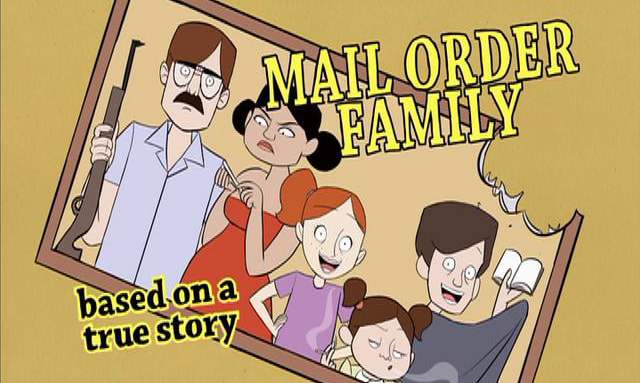
Yesterday, Deadline reported that NBC/Universal had purchased an option for a possible half-hour sitcom based on a web series called Mail Order Famiy. The series, which is co-created by the same creators of Superstore (Ruben Fleischer and David Bernad), follows the story of a recently widowed man who purchases a mail-order bride from the Phillipines to help him care for his two preteen daughters; it is loosely based on Superstore writer-producer Jackie Clarke’s childhood.
I had a chance to view the Vimeo of the Mail Order Bride webseries before it was removed from the public domain. It is exactly as racist, sexist, demeaning and offensive as you can imagine, and possibly worse than you could imagine. It’s also just plain terrible.
The idea of turning this series into sitcom is a horrible idea. Human trafficking is not funny.
Regardless of what euphemisms you use to label the industry, the practice of purchasing and importing a person to make them your wife is human trafficking. Period.
As previously outlined in this blog, there is currently an international epidemic of trading in human lives. Every year, tens of thousands of people are trafficked from one country into another. Most of them are trafficked from developing nations into developed ones. The vast majority of human trafficking victims are kidnapped, sold, or duped into the control of a human trafficking ring. Whether by threat of force or poverty, human trafficking victims have very little agency. Most do not profit off of their own sale. Many human trafficking victims are sexually, physically, and economically abused by their purchasers. Some are killed.
The vast majority of humans trafficked into the Americas are from Asia, and specifically from Southeast Asia. The vast majority of human trafficking victims are women or young girls, sold for sex or into indentured slavery as low-skilled domestic workers.
We have stereotypes in America about the mail-order bride industry. At its most benign, we believe that stories of mail-order brides are cheeky, funny fish-out-of-water tales of hopelessly mismatched lovers. At worst, we think mail-order brides might be duplicitous con artists. We assume that these women are free agents who willingly enter into a blind marriage. Even the web series show card for Clarke’s Mail Order Family webseries (above) caricatures the Filipina mail-order bride at the heart of the story as a dispassionate shrew who files her nails to the chagrin of a hen-picked husband. In America, we portray the female victims of human trafficking as the domineering, predatory exploiters in a situation that, in reality, is all about their exploitation.
Rarely do we pull back the veil of the mail-order bride industry to confront the fact that these women are being exploited – economically, as well as sometimes physically – to sell themselves to a foreign husband. Whatever choices they have to become mail-order brides, those choices are rarely meaningful.
Rarely do we note that imported foreign brides are often purchased by American men who openly repudiate feminism in their frank search for a subservient and submissive Asian woman who will fulfill his racist fantasies of a woman who ‘knows her place.’ Reports 89.3 KPCC:
Richard Novac was done with dating American women. After a failed 18-month marriage and forays into the L.A. dating scene, he decided that women here were too independent.
So he turned to the internet for a foreign bride.
After five years of research, Richard ruled out Eastern European women because he wasn’t rich enough, but Filipino women fit the bill; English is their first language, Catholicism promotes traditional values, and they are petite.
“I came to the conclusion, correct or incorrect, that our culture has been doing a disservice to women,” Novac said.
The search for supplicant brides often leads American men to the Philippines.
(You should click through and listen to the whole segment.)
Rarely do we challenge the statistics showing that many mail-order brides find themselves linguistically and culturally isolated in their marriages, and legally dependent upon remaining in marriages with their husbands in order to maintain citizenship status. Most have no escape if they are domestically abused; and they most likely will be: domestic assault incidence rates are particularly high among marriages involving mail order brides.
Rarely do we consider that the whole mail-order bride industry has its roots in archaic traditions of buying and selling of women as property.
Life for a trafficked person is not a 30-minute comedy. There is no laugh track or after-school moralizing for a person bought and sold into marriage. After the half-hour is up, there is no curtain call, no wrap party, and no production assistant from the wardrobe department ready to help you out of your costume.
Human trafficking is a dark, violent reality for thousands of vulnerable and exploited immigrant women — including thousands of exploited Asian and Asian American women and girls. And yet, somehow the oppression of mail-order brides — and the industry that profits off of their sale — is something that NBC thinks we can and will find hilarious.
NBC, like most television networks, has a diversity problem. If the show is developed, Mail Order Family will enter into a television marketplace where 80% of TV showrunners continue to be white men and where Asian Americans are grossly underrepresented both in front of and behind the camera. Much of this year’s conversation on increasing media diversity has focused on growing the abundance of non-white faces in starring roles. But, that’s quite simply not enough.
The cause of television diversification is not advanced when a White writer like Jackie Clarke offers an inevitably racist and sexist stereotype that is totally insensitive to the human suffering of the politics referenced, while existing, potentially subversive Asian characters are routinely white-washed. It cannot help but tell Asian American audiences mainstream media finds us good enough to have our pain and exploitation served up as comedic entertainment, but not good enough to tell the real and human stories of our everyday lives.
Act Now! Sign this petition demanding that NBC pull the plug on any Mail Order Bride project, and check out this Facebook event page for further organized protests.
Update (9/30/2016): After outcry from numerous Asian American outlets including this blog, an NBC spokesperson announced to NBC News that the company had decided not to go ahead with the Mail Order Family sitcom pitch.
“We purchased the pitch with the understanding that it would tell the creator’s real-life experience of being raised by a strong Filipina stepmother after the loss of her own mother,” an NBC spokesperson told NBC News in a statement. “The writer and producers have taken the sensitivity to the initial concept to heart and have chosen not to move forward with the project at this time.”

